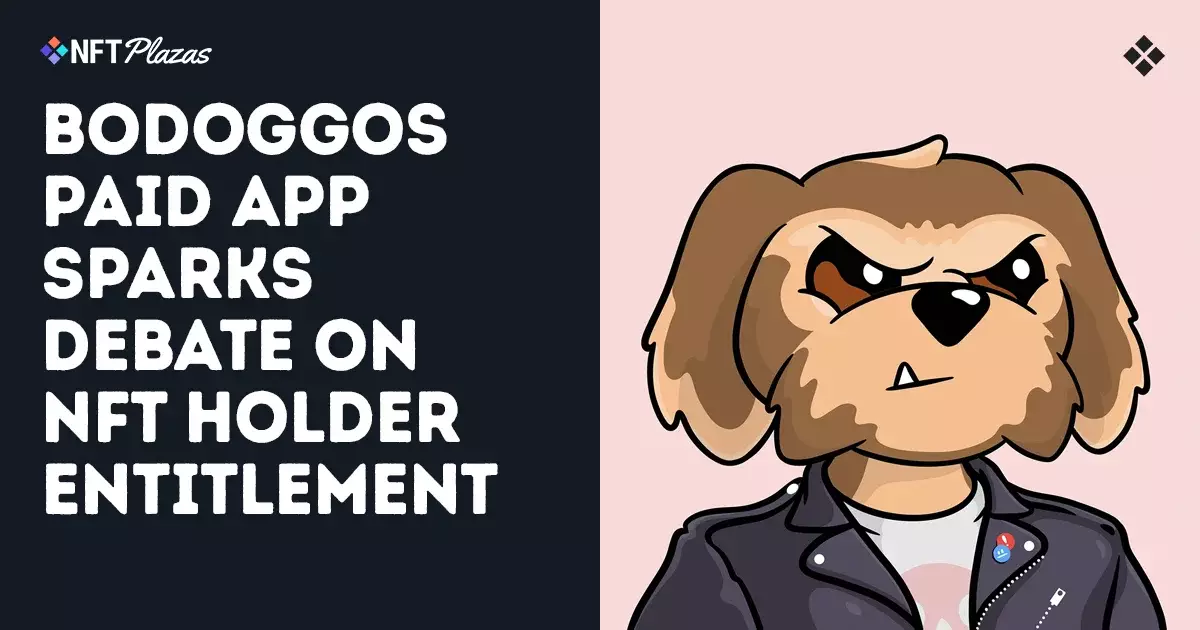The ongoing controversy surrounding the BoDoggos NFT project demands the NFT community take a long, hard look in the mirror. Recently, a tweet from user @Lewsiphur ignited a firestorm, questioning whether NFT holders are entitled to free access to future products, particularly a newly launched trading news app. The crux of the issue revolves around whether merely owning an NFT warrants perpetual perks, as suggested by many collectors and enthusiasts.
As BoDoggos CEO Nick O’Neill defended the decision to charge a discounted fee for access to the app on the grounds of covering “ongoing costs,” it raises a critical question. Are NFT holders justified in expecting continuous benefits from their investments, or is this expectation a flawed understanding of how this new economy is supposed to function?
The Illusion of Entitlement
At the heart of this debate lies an unsettling illusion that NFT ownership equates to unending entitlement. Advocates like @Lewsiphur argue that purchasing an NFT should guarantee access to any forthcoming utilities, assuming a kind of lifelong membership status. This entitlement mindset paints a picture romanticized by the thrill of initial investment without accepting the stark realities faced by those running the project. Leon Abboud, CEO of Unfungible, aptly pointed out that the expectation of a “one-time purchase” leading to a “lifetime of entitlement” is perhaps what’s holding the NFT space back from achieving its potential.
This notion is galling. The truth is that managing an NFT project is not merely about creating attractive digital assets. It entails real costs associated with ongoing development, marketing, and operational support. BoDoggos is not a charity, and neither is any other project in the NFT space. To dismiss the necessity of a sustainable revenue model in favor of consumer expectations does a disservice to the innovators attempting to bring digital art and collectibles into the mainstream.
Web3 vs. Reality: A Business Perspective
There’s a chasm between the utopian vision many have for Web3 and the gritty realities of running a business. NFTs, at their core, are still products—products that need a working business model behind them to ensure their survival and evolution. As @mattmedved pointed out, these endeavors are run by individuals who have bills, families, and responsibilities. They need to find a balance between rewarding loyal customers and keeping the lights on.
Yet, this has spurred other debates about the appropriateness of charging holders for access to newly developed services. The conversation doesn’t revolve solely around BoDoggos; it highlights a pervasive tension within the NFT community: how do projects deliver value while simultaneously ensuring financial viability? It’s an intricate balancing act, and brands shouldn’t be demonized for attempting to find that equilibrium.
Public Nature of the NFT Debate
The wide-ranging fallout from the BoDoggos situation has drawn reactions from high-profile collectors to everyday community members, all eager to voice their opinions. While some criticize BoDoggos for straying from the promise of “free access for life,” others emphasize the need for financial sustainability. Even within this spectrum, there are voices like those from @depressivehacks who reflect the frustrations of many who feel the NFT landscape is overrun by cash grabs and speculative behavior.
This discussion also encourages projects to focus on building community rather than simply issuing tokens for investment. While it’s beneficial to have stakeholders invested in your project, their expectations cannot overshadow the necessity of project viability. NFTs provide a groundbreaking opportunity for creators, but they must evolve in ways that address financial realities.
What’s Next for NFT Holders? Facing Uncomfortable Realities
Going forward, the NFT community must grapple with the uncomfortable truths that arise from entitlements and expectations. Token holders must recognize that they, too, share in the responsibility of supporting the projects they care about. Instead of simply demanding value from creators, a more productive approach could involve transparent discussions about project needs and the potential for ongoing engagement.
As the NFT space matures, we may find our understanding of utility and value shifting. Perhaps it is time to challenge the status quo, away from entitlement, towards a mutually beneficial relationship where holders and creators engage in a dialogue about sustainability and value exchange. The conversations triggered by BoDoggos serve as a critical step in that direction, pointing us towards a more nuanced understanding of what it truly means to be a part of this vibrant, dynamic digital marketplace.

